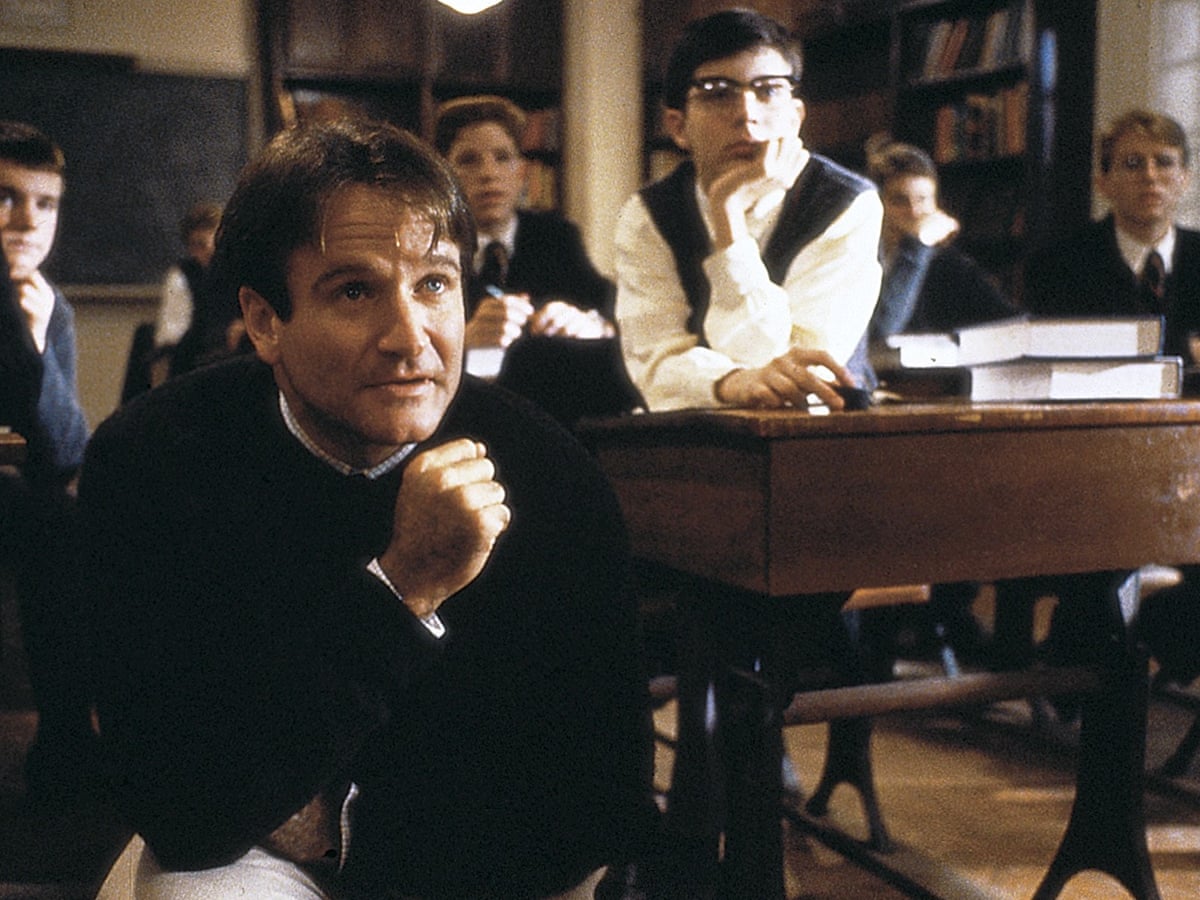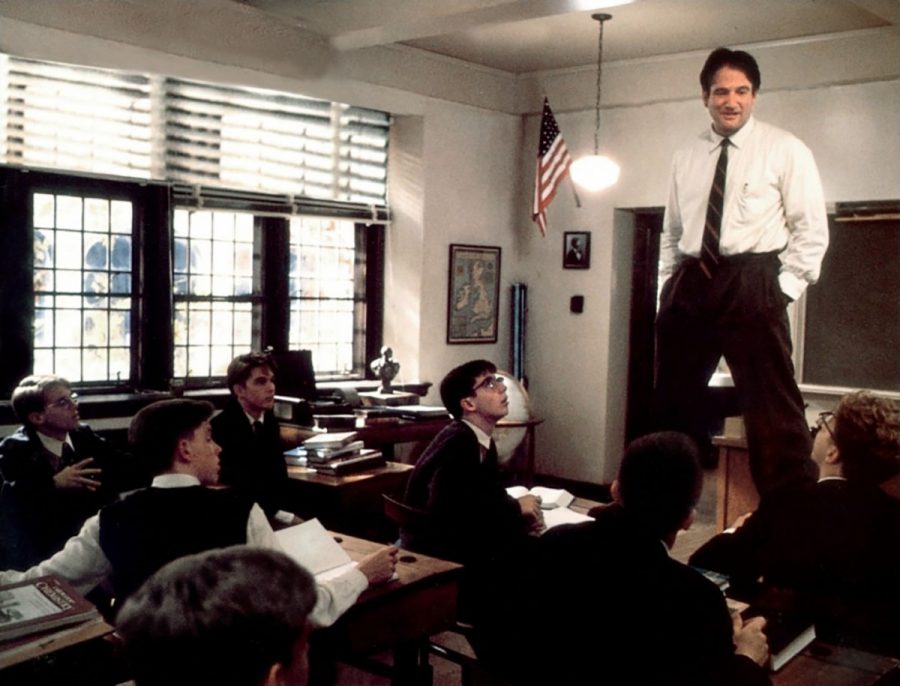Dead Poets Society is a bit of an odd duck in terms of culture.
Produced in the 1980s, Dead Poets Society comes in at the tail end of a decade well-known for its movies centered on the youth. Following in the footsteps of films like The Breakfast Club, Say Anything, The Karate Kid and more, Dead Poets Society was not an anomaly in the late 1980s, one of a crowd of films revolving very heavily around teenagers and their problems.
By the same token, it’s also coming in at the tail end of a string of films set on analyzing the culture of the 1950s. Starting with films like American Graffiti in 1973, this brand new generation of filmmakers of the ‘70s and ‘80s began to take a closer and more accurate look at the 1950s, the times they’d grown up in. Films like Stand By Me, The Outsiders, Back to the Future and Dirty Dancing were some of the most prominent in a long series of works dedicated to a less rose-tinted look at a decade often oversimplified.
As such, Dead Poets Society falls in a rather odd position of being both an ‘80s film, and, in a way, a ‘50s film.

Why does this matter?
Very simple.
In order to understand a film, it’s important that we understand what kind of climate it was being released in, and, as a result, what kinds of things the story is about.
See, no film is separate from the culture it was created in, and every movie is directly impacted by the culture and other films around it, for obvious reasons. After all, a product made by people living in a certain kind of culture is going to reflect that culture.

That’s not a bad thing in and of itself. In fact, it’s just cause and effect. But sometimes, a film showing its age can make all the difference to a modern audience, leaving who like experiencing movies that have come before us with a question:
Is there such a thing as too dated?
Or, more specifically:
Is there such a thing as being set in a culture so removed from our own, that our enjoyment of this piece of media is reduced?

Which is the question we’re going to be looking at today. Is Dead Poets Society too dated to be enjoyed by a modern audience?
Let’s take a look, starting with the culture it’s meant to portray: boarding-school America of the 1950s.
At first, it can be easy to see why some people might grit their teeth and wince at the ‘datedness’ of the culture in which the film is set. Scenes like Charlie’s paddling in the Principal’s office are unthinkable to those born after corporal punishment in schools were gotten rid of, and the problems with such a system are immediately obvious.
But then, that’s probably intentional.

The characters in Dead Poets Society treat these elements that we think of as abhorrent as facts of life, because to them, they are. There’s no thought given to a system that controls its students, or parents that come across as controlling and potentially abusive, because according to ‘traditional’ 1950s values, they were in authority over the youth. This is actively portrayed in the film’s meta as a bad thing: we as audience members are not supposed to agree with this. We are, however, supposed to root for the boys to find a way to change it.
Of course, this is not to say that there were no rabble-rousers in the 1950s, because that’s simply not true. Overlooked and undiscussed in Dead Poets Society are the youth who were actively breaking away: the Beat generation was off and running, defying the authority that they deemed obsolete. With that said, however, most of these types, the ‘greasers’ and others of that kind, were typically found in lower to middle-class society, and that, quite frankly, is not who Dead Poets Society is about.
While it could be considered an oversight on the part of the film, it’s also possible that the intention of Dead Poets Society was to look, not just at the 1950s, but at a specific subculture of the 1950s: the rich and elite.
Dead Poets Society is interested, not just in countercultural movements, but specifically the ones that are undertaken by those weighed down by tradition at the top. It’s focused on the rules and regulations passed down and expected to be held up by those who are meant to become ‘respectable’ members of society: doctors, lawyers, bankers, and more. In that, the context is a little different, and their ‘rebellion’ is more subdued. These are newbies at non-conformity, newbies still afraid of their parents (and society’s) disapproval, hence Charlie’s hesitancy and eventual treachery, Neil’s subdued reaction to his father, and even Todd’s reluctance to speak out, to disappoint. These are boys becoming men, being taught to use their words to explore and break out of the molds that their families, that this school, has put into place.

But, of course, the way that this mold is examined in the film is potentially different than the way we’d examine it now, simply because the film was made in a different time.
The 1980s, as I mentioned, had already dedicated quite a bit of time to analyzing the 1950s, but even then was a different time than now. That said, there is little that happens in the film that is portrayed in a way that wouldn’t be done today, with one exception:
Knox’s pursuit of Chris.
The 1980s were unfortunately pretty good at ‘romances’ that bordered on (and sometimes fell right into) unacceptable behavior: Sixteen Candles, Revenge of the Nerds and plenty more films tended to blur the line between ‘devoted’ and ‘creepy’. Knox’s behavior definitely comes across as shades of this: following Chris to her school, pushing his way into her classroom to read poetry aloud, and especially his kissing her while she’s unconscious can come across as more than a little alarming to modern eyes, but portrayed as mostly harmless within the film’s context. Unlike the previously mentioned ‘paddling’ scene, this is not portrayed as a problem.

With that said:
Dead Poets Society is dated, yes, but mostly dated intentionally. The film is pointing to a period past, intentionally pointing out the problems present in a previous decade and looking at a potential cautious solution to conformity. For the most part, the film is portrayed much as it would be today (with one or two exceptions) and for the most part, still holds up.
Films made about previous time periods are tricky, because the unsavory elements of that period are on display, and it’s difficult to ensure that they’re demonstrated in their own context, but with our own personal understanding of why things have changed. The movie is critical of the period it’s examining, and for the most part, it’s successful in remaining understanding, but analytic of the context of the story.
The ideas upon which Dead Poets Society are founded are unchanging despite the changing of time: the value of individualism, the importance of free-thinking, and the power of words. These ideas, and the way they are explored within the film itself, will always be relevant and needed in the culture. As such, for the most part, the film remains enjoyable to a modern audience, showing a different age, a different culture, and how things have changed, and what values haven’t.
In short: Dead Poet Society is an earnest story about the power of words and individuals, which remains equally important in 1959, 1989, and beyond.
Thanks so much for reading, and I hope to see you in the next article.